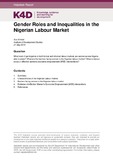| dc.contributor.author | Enfield, Sue | |
| dc.coverage.spatial | Nigeria | en |
| dc.date.accessioned | 2019-10-01T11:40:21Z | |
| dc.date.available | 2019-10-01T11:40:21Z | |
| dc.date.issued | 2019-05-21 | |
| dc.identifier.citation | Enfield, S. (2019). Gender Roles and Inequalities in the Nigerian Labour Market. K4D Helpdesk Report. Brighton, UK: Institute of Development Studies. | en |
| dc.identifier.uri | https://opendocs.ids.ac.uk/opendocs/handle/20.500.12413/14727 | |
| dc.description.abstract | Across the world, women juggle work with family and care responsibilities, and Nigeria is no exception. Early marriage and family formation play a critical role in women’s access to jobs and it is a more significant issue for young women from poorer households than others. Although girls are more likely to leave school early than boys, they do not then get a job. Instead, young women are much more likely to marry early than men are. At age 20, less than 4% of men are married, compared to about 50% of women in rural areas. With early marriage comes early pregnancies and household responsibilities that effectively remove women from labour market opportunities. Women in Nigeria are less likely to be active in the labour market; more likely to be in lower-earning opportunities like farming and informal jobs; and earn less for a given level of education and experience than men of the same level. Within the world of work women’s success is limited by lower levels of education; barriers in access to finance and digital connectivity that would open their access to market information and mobile banking services. Women are more likely to become entrepreneurs than men out of economic necessity. But in business women make different strategic decisions since they are constrained by gender-specific factors (household related demands, the contexts in which they operate, their assets). These influence the decisions that female entrepreneurs make, choosing low risk sectors that can be entered with low level of investment. A gender gap in profits as high as 39% is found between male and female led small and medium enterprises In Nigeria. Government policies are dominated by interest in the formal sector, although women are to be found in far greater number in agriculture, non-farm enterprises and the informal sector. This is another example of gender bias in Nigerian institutions where legal, political and cultural ceilings limit women’s potential in the labour market. The net result is that almost twice as many women as men live below the poverty line. | en |
| dc.language.iso | en | en |
| dc.publisher | IDS | en |
| dc.relation.ispartofseries | K4D Helpdesk Report;597 | |
| dc.rights.uri | https://www.nationalarchives.gov.uk/doc/open-government-licence/version/3/ | en |
| dc.subject | Economic Development | en |
| dc.subject | Gender | en |
| dc.subject | Work and Labour | en |
| dc.title | Gender Roles and Inequalities in the Nigerian Labour Market | en |
| dc.type | Helpdesk | en |
| dc.rights.holder | © DFID - Crown copyright 2019 | en |
| dcterms.dateAccepted | 2019-05-21 | |
| rioxxterms.funder | Department for International Development, UK Government | en |
| rioxxterms.identifier.project | K4D | en |
| rioxxterms.version | VoR | en |
| rioxxterms.funder.project | 238a9fa4-fe4a-4380-996b-995f33607ba0 | en |

